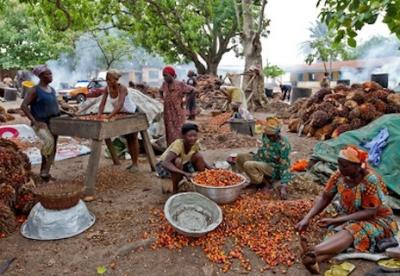Ghana’s Rural Enterprise Project (REP) demonstrates that – with clear-sighted goals, well-defined targets and determined international donor support – state-driven social intervention can succeed.
Initiated by the government in 1995 under the auspices of the GRATIS Foundation and with the support of the International Fund for Agricultural Development (IFAD), the project seeks to reduce poverty and improve living conditions in rural areas through increased productivity for the rural poor.
Making a real impact
According to Ulac Demirag, the Country Programme Manager of IFAD-Ghana, REP is one of IFAD’s best performing programmes in West and East Africa. With an initially modest target of about ten districts in the Brong Ahafo and Ashanti regions, the project has expanded and recorded achievements which have received glowing recognition from other international donors such as the African Development Bank.
In 2002, the Ghanaian government and IFAD scaled up the project to cover 66 districts that were considered amongst the poorest in Ghana. Within these operating districts, there have been verifiable success stories as exemplified by the number of businesses operating sustainably and making profits over the last decade.
With 70% of Ghanaians – and around 86% of the population who live below the poverty line – living in rural areas, REP’s targeting of economically-active youth and women in the rural areas lends support to a strategic area of the country’s development.
Conservative estimates from the government indicate that over 170,000 people have been trained under REP in various community-based trading and enterprise development undertakings. Between 2003 and 2010, almost GHS150000 ($83,000) was been disbursed by financial institutions involved in the project. A Graduate Apprenticeship Scheme initiated in 2009 has so far produced over 12,000 new businesses. And several rural-based small and medium-scale enterprises (SMEs) dealing in things such as clothing, textiles, soap-making, carpentry, hairdressing and food-processing have benefited from the project’s business development services, technology transfer, apprenticeship training, and rural finance services.
Many of the major beneficiaries have been women. In the Garu-Tempane District of the Upper East Region, for instance, half of the 1,200 clients using support services are female. And in the same district, women are healthily represented in the 150 new businesses and 700 jobs created in 2011.
REP is also among the few national interventions that have survived the turbulence of Ghana’s schizophrenic development planning since 1992. While the country’s policy atmosphere has considerably fluctuated under different governments, with many initiatives either being abandoned or significantly altered after general elections, REP has done well to maintain a degree of steadiness.
The reality factor
Before REP, Ghana had been through a decade of intense liberal reforms under the Economic Recovery Programme (ERP), a programme that was blamed for the country’s perennial cycle of rural unemployment, massive rural-urban drift, and the expansion of the country’s informal sector.
Although ERP was rationalised on the basis of rural economic transformation, several measures that were undertaken as part of its implementation adversely affected key areas of the rural economy – especially the agricultural and mining sectors.
The withdrawal of agricultural subsidies for inputs like fertilisers and cutlasses, for example, reduced its viability. On the other hand, the privatisation of the mining industry also came with retrenchment exercises that often led to further rural unemployment which in turn increased rural-to-urban migration.
By the mid-1990s, Ghana was confronted with a serious economic and social crisis in urban areas, largely due to the failure of its rural economy to generate employment and local development. Those who could not move to urban areas often resorted to small-scale and often illegal mining and other subsistence endeavours.
The national scorecard
Unlike its predecessor, REP was conceived in a manner that reflected the practical problems of the Ghanaian economy as it related to rural areas. In a bid to transfer innovative technologies for improved productivity, for example, the Rural Technology Facilities project was introduced which offers apprenticeship training in viable artisanal trades, agro-processing, and metal-based artisans for unemployed youths.
REP is set within an institutional and operational framework that supports nationally-driven initiatives and institutions for development but with strong scrutiny by external donors. The project’s objectives have been well-defined and structured to achieve a dual purpose of enterprise development and rural employment.
Its success has also been welcomed on the basis that it operates alongside existing national institutions. For example, the project is closely aligned to the country’s decentralised administrative and planning system which operates through various partnership arrangements with District Assemblies, the National Board for Small Scale Industries and the GRATIS Foundation. And local governments have also been given an important place in the implementation of programmes, which has helped enhance community ownership of REP.
REP also benefits from periodic monitoring and evaluation by leading donors like IFAD. The government has developed an evaluation strategy that includes a base-line survey followed by mid-line and completion surveys around thematic areas such as relevance, effectiveness, and efficiency.
Room for improvement
As many Ghanaians revel in the remarkable success and well-noted institutional and operational strengths of REP, there are also some legitimate suggestions that the project could benefit from a more holistic approach from the government, especially in tackling the structural unemployment and underdevelopment of rural communities.
In spite of REP contributions, there are also some concerns that progress could be undermined by the decreased attention given to other rural development priorities, especially in areas such infrastructure building. In addition, increased partisan involvement in local governance has also produced various policy initiatives that have sought to promote similar objectives to REP but which have no meaningful harmonisation with REP.
The many parties involved in REP’s success must be wary of these upcoming challenges to ensure the project continues to yield the impressive successes it has thus far, and go from strength to strength.
Nelson Oppong
ThinkAfricaPress.com


